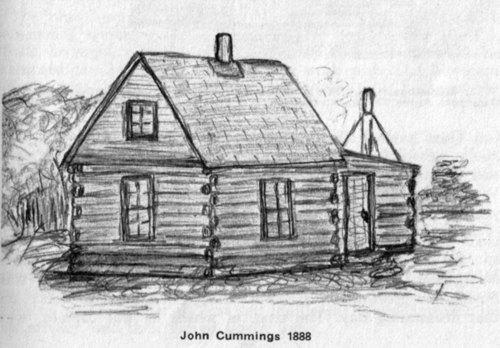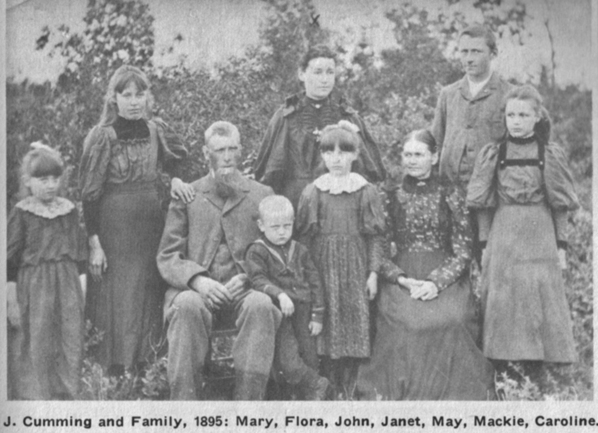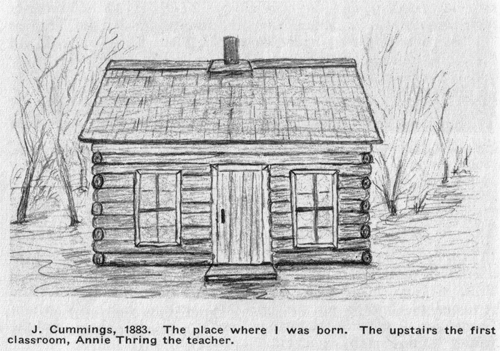John
Cumming was born in County Beauharnois, P.Q. (south of Montreal),
1842.
His parents, Scottish Highlanders, had migrated to Canada, 1831, during
the
period of great depression in the British Isles. The land where they
settled,
forest-covered and swampy, had to be cleared and drained before it
could
he cultivated. He was brought up in a typical pioneer community where
opportunity
for education was meagre and the amenities of life almost non-existent.
Regardless
of the many privations he, his brothers and sisters and many cousins
had
happy lives.
At the age of eighteen he left home to find work. This took him to
Montreal,
where one could always engage with a shipping company on the St.
Lawrence
and the Great Lakes. So it was that he served his time to become a
first
class machinist and, some years later, qualified for a certificate as a
lake
Captain.
1864 found him in Halifax shipping on an English blockade runner
carrying
food and war materials to the southern States and taking out cotton for
the
mills of Britain. The vessel on its way down the coast was sighted and
chased
by a United States’ Man-Of-War. It was a close call; but the
blockade runner
was
able to make Havana just ahead of the pursuing vessel. The onecheered
the
other as they sailed side by side into the neutral harbour.
Then to steal out from Havana and make New Orleans was another thrill
for
the adventurer. There he left the British ship and enlisted in the
northern
army just about the time the Civil War ended. He then joined the United
States
navy, serving four years on the Dictator. He always commended the
American
system of fair wages and promotion for the working man.
On his return to Canada he engaged with the Northern Navigation Company
working
out from Chicago, where he was during the great fire. He related many
times
his experience on that devastating day. The boat, of which he was
captain,
was jointly owned by himself and a banker. It had been docked some
distance
up river where the fire swept down, threatening all the boats. They
attempted
to move a number of vessels out, but the bridge closed to enable the
fleeing
crowds to cross lo safely. Policemen stood guard, so it took
considerable
entreaty and threatening to persuade the officers of the law to open
the
bridge for a short time to let the boats through. Finally this was done
without
hazarding the lives of the fleeing refugees. So the vessels were saved.
A storm on Lake Michigan drifted a small boat in which a little boy was
playing
out into the open water. The frantic parents begged that someone go to
the
rescue of their small son. No one was willing to risk his life by
venturing
out in a gale such as that. At last the appeal was made to Mr. Cumming.
He
consented to run a tug boat out, despite the danger. This he did, and
reaching
over as he came alongside the small craft, he lifted the child safely
aboard.
The wee fellow looked up, quite oblivious of the danger, and said,
"Frankie
had a good ridy." The gratitude of the parents remained always a
pleasant memory.
His boat was lost in a storm, the joint-owner got and kept the
insurance
leaving his partner pretty well insolvent.
Just at this lime, 1878, four nephews, sons of a brother who had been
killed
in an accident, required direction and assistance in settling down to
make
a living. Again, the opening up of the west seemed the solution. The
lure
of cheap land on the prairies enticed many an easterner to pull up
stakes,
and on April first
1879 John Cumming was on the Marringhurst plains, purple with anemones,
searching
out a homestead. lie filed on Sec. 18, T.4,R.12, arranged with James
Wilson
to build his shack while he returned to Chicago for the summer's work
with
The Northern Navigation Company. Returning west in the fall, he spent
the
winter in the small log cabin.
It was a unique experience, cooking meals, baking bread and fishing
through
a hole in the ice in nearby Rock Lake. Such fish! One huge pike
measured
twenty-nine inches in girth and was correspondingly great in length.
A walk of nine miles to Pilot Mound for the mail was an after supper
diversion.
On a frosty, moonlight night, as he made his way over the snowy plain,
he
saw a wildcat sitting on the road. He hesitated a moment, in ease the
animal
attack; but decided to take a chance so strode casually along and
passed
the fierce looking night prowler. It just sat, indifferent to the
intruder
on its privacy, and then moved slowly away.

Neighbours were few; McKnights, the nearest, became life- long friends.
Three
young Englishmen, William and Frank Price, and Mr. Esplin spent the
winter
here. The former remained in Manitoba, later settling north of Huntly,
and
still later moved to Baldur. Frank, having had enough of it, went to
Vancouver
Island to end his days. Mr. Esplin, too, though deciding to remain
finally
settled in Glenboro. James Walsh, owner of a saw mill, his two sons and
his
daughter, Maggie, lived within easy visiting distance.
In the spring of 1880, once more the walk to Emerson to take the train
and
back to the boating in Chicago.
In the fall of 1880 the Maxwells came bringing his wife and the small
daughter,
May. When navigation closed he returned west for good.
The spring of 1881 was one of high water. Never had the Assiniboine
flooded
its banks so extensively. Father was engaged to take a boat, the
Marquette,
up to Fort Pelly to bring the Governor-General, the Marquis of Lome,
and
his wife, Princess Louise, down to Brandon. He and Albert Cramer set
out
to meet the boat at Portage la Prairie. They walked across country,
wading
through water a great part of the way, slept in an Indian tepee one
night
and reached their destination on schedule.
The journey up the Assiniboine in the Hudson's Bay stern wheeler,
sometimes
in midstream, sometimes taking a short cut from bend to bend, required
considerable
skill in navigation. There were numbers of passengers aboard bound for
various
places between Winnipeg and Brandon. A young minister and his wife were
landed
on what appeared to be an island. There was no one
at the boat to meet them. Father often wondered how they fared. Often
the
boat had to pull in to take on wood for fuel. Sometimes an Indian
wandering
along the bank would be startled into a panic at the sound of the
shrill
whistle, much to the
amusement of crew and passengers.
At Fort Pelly the Governor-General had just completed negotiations and
the
signing of the second Indian Treaty. In farewell, every member of the
assembled
tribes must shake hands with the departing dignitary, until The
Marquis,
unable to raise a hand, let it lie limp on the table. Each Indian came
along,
picked up the weakened member, shook it vigorously, put it down and
passed
along.
The trip back to Brandon was without incident. The Royal Couple
graciously
thanked father for the safe journey, shaking hands in farewell as they
left
the boat. Here he bought a blacksmith shop which he sold later, and a
Red
River cart and pony to carry him and Willie Maxwell across country to
Rock
Lake. Over
the prairies with a compass was to father a voyage on the Great Lakes.
In 1883 father moved to Huntly (still unnamed) where the Maxwells had
settled,
procuring the quarter across the road N.E. 1-14-15. During the winter
David
Maxwell became seriously ill and died, the first death among the
pioneers.
His grave, unmarked, has disappeared.
In February, 1884, father went East to Ormstown for a car- load of
cattle.
After a winter of deep snow, he arrived back in Emerson in March at the
time
of a spring thaw. The bringing of those animals by way of Pembina
Crossing,
south of Manitou, and on home was no mean task. He did it without a
single
loss. On
the way he came to a homestead near the crossing whose owner had a
stable
snow-covered that had first to be dug out to the doorway to let the
cattle
in, and a stack of hay. Here they stayed until the herd was well rested
and
well fed before continuing the journey home.
It was a well-selected load of stock. I can still remember Bell, Aggie
and
Mag, fine cows, that were the progenitors of good herds in the
surrounding
districts.
In 1887 Charles McKay, another immigrant from Ormstown, bought his
farm,
and on New Year's Day 1888, he moved to Mr. Henry's (a Metis) on the
bank
of Lorne Lake. I do not know if Father had anything to do with the
naming
of the lakes we could see from our door, or if it were coincidence that
they
were so
named Lome and Louise.

In 1894 Moropano Post Office was moved from Johnson's near the Rosehill
district
to our home. Here it stayed until 1905 when a petition was circulated
requesting
that it be moved to Neelin, on the newly built C.N.R. which ran from
Greenway
to Wakopa.(1904).
Here Father lived until his death November 18, 1931, at the age of
eighty-nine
years, ten months.

It was a long life full of interesting experiences and hardships. Once
a
Conservative in politics, on the issue of Free Trade he became an
ardent
Liberal, upholding the Laurier government on the above, and on the
conscription
policy during the First World War.
The farm was taken over in 1923 by John Jr. who occupied it until 1965
when
he retired to Belmont.
|



